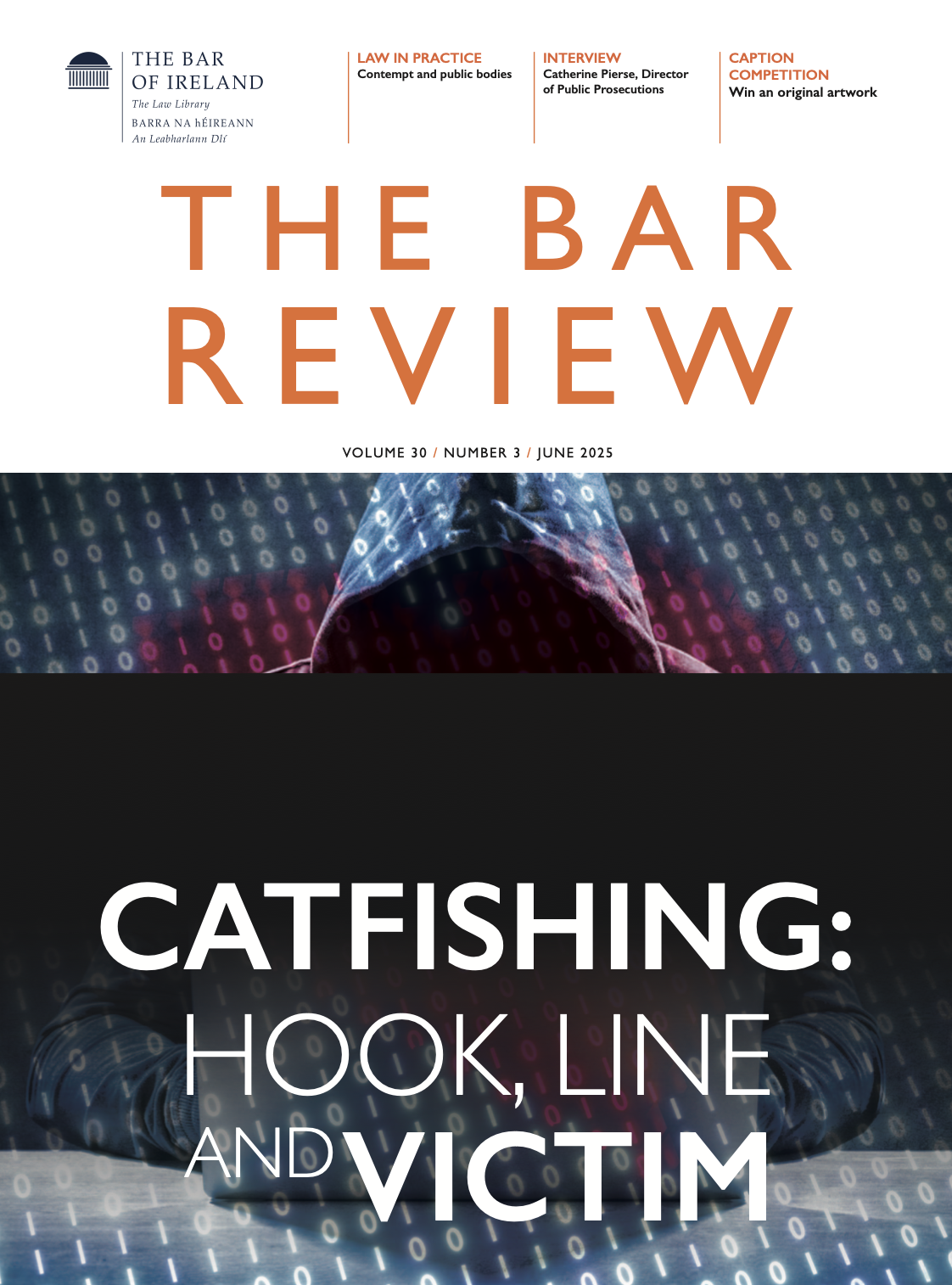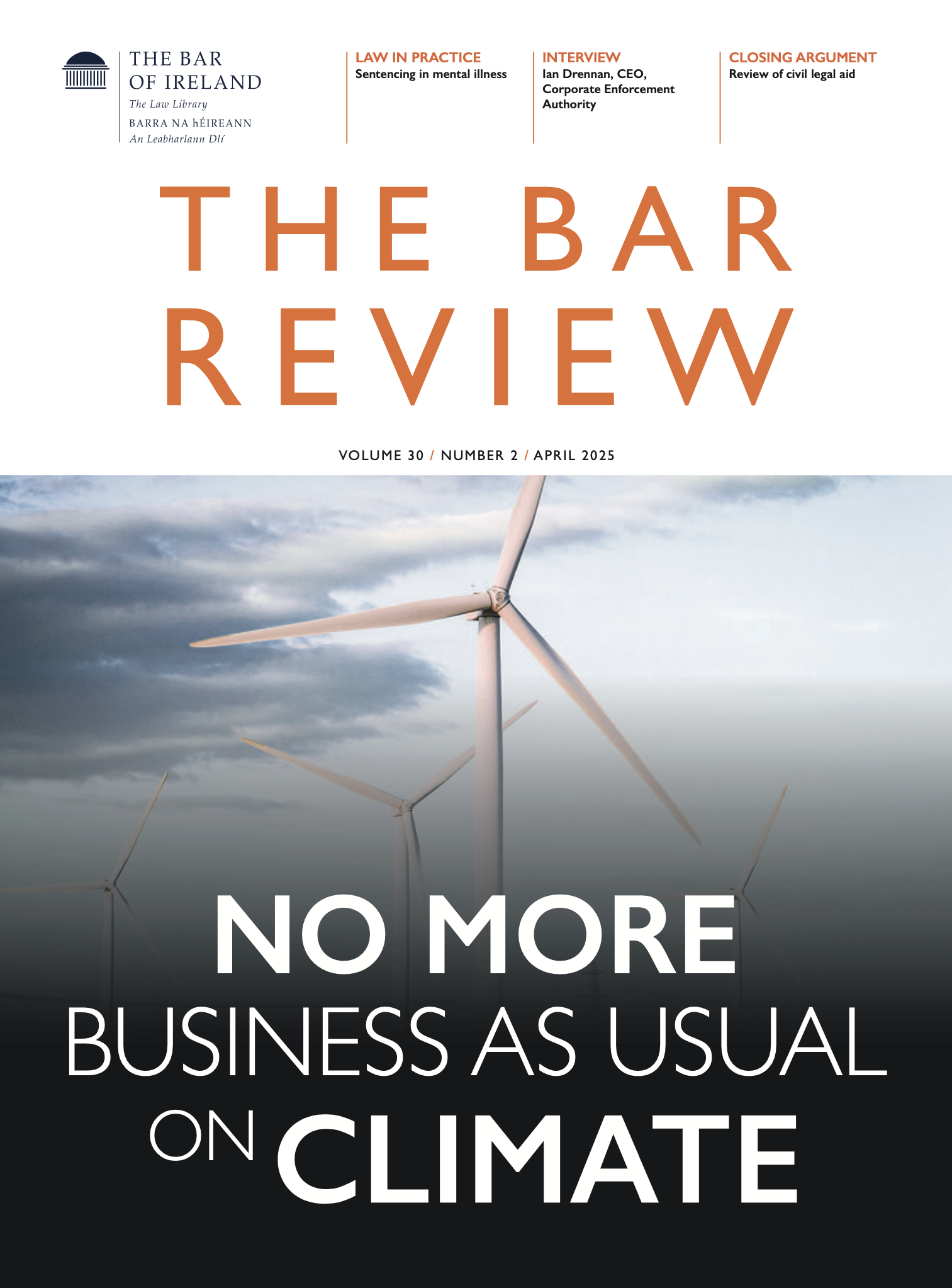Latest legal updates, news and articles from the October issue of The Bar Review include an interview with Chief Justice Donal O’Donnell, and examinations of parental alienation, crypto-assets, wasted costs orders and more.
Highlights from October Issue
The Move to the Bench

Chief Justice Donal O’Donnell spoke to The Bar Review about his career, his views on access to justice, and his wishes for his tenure.
Chief Justice O’Donnell is one of a small group of barristers who were elevated straight from the Bar to the Supreme Court. He says there was a significant adjustment in mindset to be made: “I have a very vivid recollection of my first day on the Court hearing a case. It was a very interesting case, and it wasn’t clear cut who was going to win. I could almost see the thought going through the senior counsel’s mind, you could see him relaxing and saying, ‘well, there’s nothing more I can do in the case. I wonder what they’ll do’. And I sat there thinking well, that’s what it looks like from up here, and this isn’t so bad. Then I realised, what are they going to do? That’s what are we going to do? And the convention in the Supreme Court is that the most junior judge goes first in the conference, so in a few minutes, we were going to go into the conference room, and the next thing was going to be, ‘Well Donal, what do you think?’”.
There are, of course, aspects of his role that he enjoys more than others: “I enjoy the judging, I enjoy being in court, and I enjoy trying to work out the answer. Sometimes it’s a bit like a puzzle. If you feel you can make it fit together in a coherent picture, that’s satisfying. I don’t enjoy writing judgments because it’s hard work, but I enjoy sometimes if I feel I’ve come to a conclusion and explained why, and it fits together, at least as far as I’m concerned. I enjoy the interaction with people in the universities, and I’ve really enjoyed the interaction with other courts. You don’t particularly enjoy all the stuff that goes with it, all the administration, the management.
The Chief Justice has a whole other job on top of the job of being a Supreme Court judge – there’s 20 plus committees and boards. Each of those things is interesting in itself, but the fact that there’s also the day job to be done is sometimes quite difficult”
Crypto-Assets & The Law

John Breslin SC & David Sweetman BL provide an overview of the current state of play, and forthcoming EU regulatory response.
At present, there is no dedicated regime for the regulation of crypto-assets. Furthermore, the extent to which existing regulatory regimes may apply is not always clear, and is a matter upon which there is no consensus even among financial regulators.
For example, whether crypto-assets can qualify as “electronic money” under the Electronic Money Directive (Directive 2009/110/EC) is fundamentally dependent on what constitutes “stored monetary value”, as represented by a claim on an issuer issued on receipt of funds for the purpose of making payment transactions and accepted by persons other than the e-money issuer itself.
This article is also available as a podcast:
At least one European regulator was prepared to accept that, in certain cases, a crypto-asset could qualify as e-money. This included where it was held on an open blockchain-based payment network, and where the issuer issued these on receipt of fiat currency intended to be the means of payment in the network, pegged to that fiat currency on a 1:1 basis, and redeemable at any time.
Parental Alienation – How is it Being Addressed in Ireland?

Lyndsey Keogh BL considers the concept in an Irish context and international developments.
In the context of considering how cases where parental alienation is raised are addressed and determined in this jurisdiction, we must turn our attention to the relevant legislation governing custody/access arrangements, which is the Guardianship of Infants Act, 1964 (as amended).
The 1964 Act, in addition to Article 42A of the Constitution, mandates that in all access/custody disputes the best interests of the children must be the paramount consideration, with section 31 of the Act setting out a list of factors and circumstances that must be considered. It is noteworthy that there is no specific reference to parental alienation, although s. 31(2)(j) makes reference to the “willingness and ability of each of the child’s parents to facilitate and encourage a close and continuing relationship between the child and the other parent, and to maintain and foster relationships between the child and his or her relatives” as a factor that the court must have regard to. The overall objective of the court is the best interests of the child. If the issue of parental alienation is raised within the context of proceedings in Ireland, the court will most likely make an order for a suitably qualified professional to carry out an assessment of the breakdown of the relationship/marriage and to make recommendations to the court in respect of access and/or custody arrangements, which often include the proposed residence of a child.
Wasted Costs Orders

Tomás Keys BL examines the new Order 99 Rule 9 of the Rules of the Superior Courts has implications for barristers in relation to wasted costs orders.
Several judgments have been delivered by the Superior Courts on foot of applications for wasted costs orders since the new provisions of Order 99 Rule 9 of the Rules of the Superior Courts, which became effective as of September 9, 2019 (‘the new Order 99’). However, the recent judgment by the Court of Appeal in Ward v Tower Trade Finance Ireland Limited and Burns (No. 2) is the first judgment delivered since the new Order 99 was introduced that considers, in detail, the principles that a court should apply when considering whether to make a wasted costs order.
During the course of his judgment, Noonan J. also referred, obiter, to the apparent expansion of the jurisdiction under Order 99 Rule 9, which appears to give the Superior Courts jurisdiction to make a barrister the subject of wasted costs orders. The expanded jurisdiction arises from the replacement of the word “solicitor” under the old Order 99 Rule 7, which deals with wasted costs, with the words “legal practitioner” in the new iteration of Order 99 Rule 9.3 This article will set out the background to the dispute, the principles to consider when deciding whether to make a wasted costs order, and the potential consequences for practitioners (both solicitor and counsel).
Also available as a podcast
Download The Bar Review – Volume 27 Issue 4

